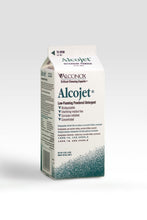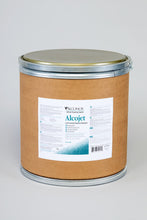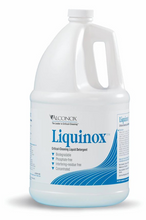Alcojet 1401 Low-foaming Powdered Detergent 100 lb Drum
Select variants from drop-down menu for prices:
- Alcojet 1403 Low-foaming Powdered Detergent 300 lb Drum
- Alcojet 1450 Low-foaming Powdered Detergent 50 lb Box
- Alcojet 1425 Low-foaming Powdered Detergent 25 lb Box
- Alcojet 1404 Low-foaming Powdered Detergent Case of 9 x 4 lb
- Alcojet 1404-1 Low-foaming Powdered Detergent 4 lb Box
- Alcojet Low-foaming Powdered Detergent
Alcojet – Low Foaming Powdered Detergent: Nonionic, low foaming powder cleaner for use in labware washers, parts washers, power-spray systems, manual and ultrasonic cleaning. Corrosion inhibited formula recommended for glassware, metals, plastic, ceramic, porcelain, rubber and fiberglass. Free rinsing for reliable results and no interfering residues. USDA authorized. Dilute 1:200. pH 11.5.
- Concentrated to save you money
- Biodegradable and readily disposable
- Non-ionic, low foaming cleaner for high performance from your cleaning machinery without damaging washer parts
- Free rinsing to give you reliable results and no interfering residues
- Use to pass your cleaning validation tests for lab accreditation and plant inspection approval
Uses:
Used to clean: Healthcare instruments, laboratory ware, sampling apparatus, plate glass, pharmaceutical apparatus, cosmetics manufacturing equipment, restaurant equipment, wine glasses, counters, floors, sidewalks and driveways, metal castings, forgings and stampings, industrial parts, tanks and reactors. Authorized by USDA for use in federally inspected meat and poultry plants. Passes inhibitory residue test for water analysis. FDA certified.
Used to remove: Soil, grit, grime, slime, grease, tars, resins, fats, oils, blood, tissue, inorganic residues, particulates, solvents, chemicals and solvents.
Surfaces cleaned: Corrosion inhibited, residue-free formulation recommended for glass, metal, stainless steel, porcelain, ceramic, grout, plastic, rubber and fiberglass. Can be used on soft metals such as copper, aluminum, zinc and magnesium if rinsed promptly. Corrosion testing may be advisable.
Cleaning method: Laboratory warewashers, water-sterilizers, washer-sanitizers, cart washers, cage washers, spray washers, electrocleaning, ultrasonic cleaners, flow through clean-in-place. Manual cleaning if proper skin and eye protection is used.
Directions:
Follow machine manufacturer’s directions and use machine’s powder detergent receptacles. In general, use 1/2 – 1% hot water wash cycle solutions (1 1/4 – 2 1/2 Tbsp. per gal., 3/4 – 1 1/4 oz. per gal. or 5-10 grams per liter—most machines need 2 1/2 oz. added at a typical 2 gal. wash cycle). For manual, soak, circulate, or ultrasonic use, make a 1% solution in warm or hot water. For abrasive scrubbing, make paste. For difficult soils, raise water temperature and use more detergent. Wear protective gloves and eyewear for manual cleaning. RINSE THOROUGHLY—preferably with running water. For critical cleaning, do final or all rinsing in distilled, deionized, or purified water. For food contact surfaces, rinse with potable water. Used on a wide range of glass, ceramic, plastic, and metal surfaces. Corrosion testing may be advisable.









